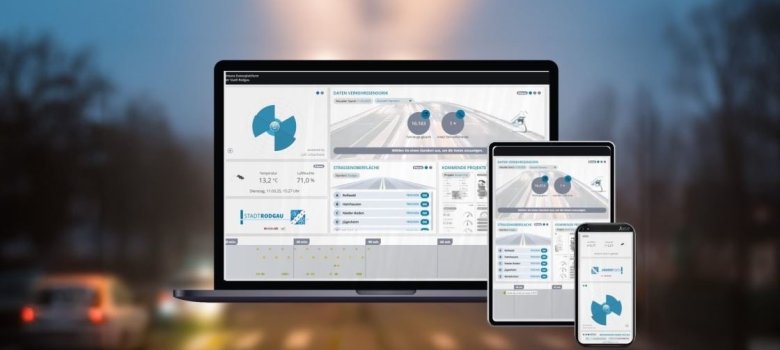Smart City
In the long term, the city of Rodgau's plan is to implement many smart control systems. These measures will be implemented successively and help to develop Rodgau into a modern, networked and sustainably smart city.
Urbanpulse as an open data platform

At the heart of the "SMART LIGHTING" project, which is being funded by the Hessian Ministry for Digitalisation and Innovation with around 1.3 million euros, is the "Open Urban Data Platform".
Smart Lighting
In future, sensor data on traffic volume, pedestrian frequency and road conditions will allow Rodgau's street lighting in the respective area to be optimised and controlled according to actual requirements. This is based on innovative analysis models implemented on the platform, which translate the data received into the optimum luminaire setting in each case and automatically transmit this to the lighting control system, promoting energy efficiency and nature/insect protection without compromising traffic safety or the quality of life in the city.
AI and scientific monitoring
By using artificial intelligence, the "Open Urban Data Platform" contributes to an optimised calculation basis and thus to resource savings. The scientific support provided by Darmstadt University of Applied Sciences ensures that the findings from the test phase are well-founded and reproducible.
Traffic sensors
The city of Rodgau uses thermal imaging technology for traffic sensors, especially in public spaces, which can also "see through" total darkness, difficult weather conditions, smoke and haze, and which technically prevents the collection of personal data. This means that traffic and road data can be made available to other administrative units, road traffic authorities and the general public via corresponding specialised dashboards. This creates data-driven added value that supports traffic planning and traffic control with real-time data, for example.
Road condition sensors
The winter road maintenance service is supplied with data from the road condition sensors, which provide information on snow and ice, among other things. In this way, the city benefits from the data obtained to optimise deployment planning and the use of gritting material.
Next steps
In the future, the city of Rodgau's plan envisages further steps, such as the integration of traffic data to optimise traffic flow and the implementation of a smart parking guidance system. These measures will be implemented successively and will help to develop Rodgau into a modern, networked and sustainably smart city.